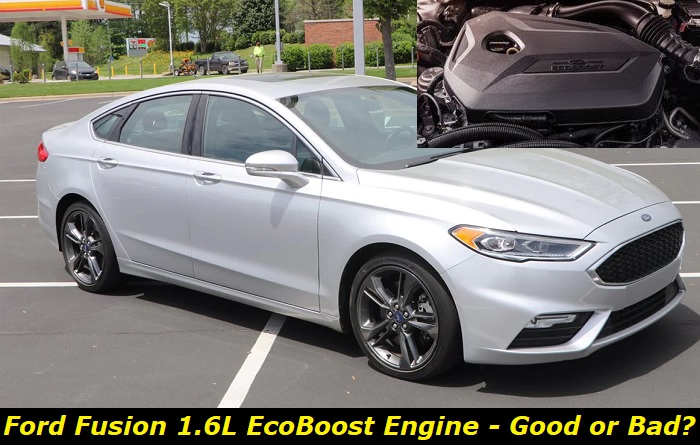The Ford Fusion was one of the most popular sedans on the market in the USA. It actually was the favorite model and even the big goal for a lot of potential buyers. We love big sedans that are comfortable enough to take us basically to any distance. Also, we like powerful vehicles that give us wonderful emotions when we drive them. Is it all about the Fusion? Well, not entirely.
Today, we'll tell you about the 1.6L EcoBoost engine that was installed in the Ford Fusion in 2013 when the second generation of the vehicle appeared on the market. Before this, the Fusion only had bigger engines and fewer problems. But then Ford decided to add some spice to the vehicle and yes, it wasn't successful with all trims and versions.

Key features and my opinion about the engine
- Production years:2010-now
- Average lifespan of 1.6L EcoBoost:160,000-190,000 miles
- Fuel supply type:direct injection
- Power range:118-197 hp
- Fuel efficiency:good
- Engine block material:aluminum
- Engine reliability score:low
- The most common problems:risk of catching fire, overheating problems, coolant leaks, no lifters, turbocharger failure.
Here's what you should know about the 1.6L EcoBoost in your Fusion
In 2013, Ford introduced the new version of the Fusion model, the second generation. And yes, it was just wonderful in terms of its design and comfort. At that time, a lot of buyers paid their money with pleasure to own the budget-friendly vehicle that looked like Aston Martin and was wonderful progress in comparison with the earlier generation.
But not all engines were really good. We can remember the legendary 2.5L Duratec or the wonderful 2-liter engine for the hybrid powertrain. But what about EcoBoost options? In 2013, the most affordable and popular turbocharged version of the Fusion was equipped with the 1.6L EcoBoost which seemed quite good but later turned out to be a disaster.
Here are some things you should know about it:
- there were different versions of the 1.6L EcoBoost and you should apply everything you will read today to all other engines;
- the engine was used in Volvo, Lincoln, and Ford cars, and the list of applications was pretty long;
- the Fusion got this engine for two years only - 2013 and 2014 - after that, the better 1.5-liter EcoBoost was installed instead;
- the Fusion got the 182-horsepower version of the engine which was really powerful for the small displacement;
- the engine got independent variable timing and this made it quite economical - you can rely on 29 mpg combined which is pretty good even now;
- also, the direct gasoline injection contributed to the wonderful gas mileage and smooth work of the engine;
- the turbocharger was pretty good and boosted this small engine to make it work much better than many competitors.
But now, after years have passed, we can make a solid conclusion and say for sure: buying any vehicle equipped with this engine is not an option! This is not safe, the engine is not reliable and it can break down due to dozens of different technical reasons. The worst thing is that Ford didn't even try to fix something because the 1.6L EcoBoost didn't even get any serious upgrades.
Well, you can think that Ford thought about buyers and eventually replaced this engine with the 1.5 EcoBoost in 2014. The engine is known to be much better than the 1.6L one. But no, Ford was thinking only about money because Chinese authorities introduced much lower taxes for cars with a displacement of up to 1500cc. So, we should thank Chinese authorities for the awful 1.6L EcoBoost being discontinued.
How long will your Ford Fusion 1.6L EcoBoost engine last?
Well, if it doesn't burn out because of numerous reasons, it will last just like any other turbocharged engine. We would say that the lifespan of 120,000 miles should be just normal for this engine. Doesn't seem like a lot? Wait a bit, we'll tell you about the problems and you'll think that 120K miles is really a lot for this engine.
Actually, we've seen a couple of 2013 Ford Fusions with this engine that had about 200,000 miles on their odometers. One of them had a new engine and the other was repaired twice investing just the same amount of money that you would invest in the remanufactured engine.
So, in terms of longevity, the 1.6L EcoBoost engine is certainly not the best option you can buy. Let's find out why this engine is so bad.
What problems should you expect with the 1.6L EcoBoost in your Fusion?
Speaking about problems, you should understand that this is the most problematic EcoBoost engine that you have ever seen. And yes, we will only outline the most common problems it has shown over the last decade. But we should warn you that there are hundreds of minor problems that sometimes may lead to bigger issues or cost you a lot to repair.
Here are the most annoying common problems you may face with your Ford Fusion 1.6L EcoBoost engine:
- Engine overheating and eventually setting on fire
These engines are prone to overheating. And you may think this is not a big deal because a lot of small-displacement turbocharged engines tend to overheat. But when you lower the RPM, they quickly get to normal temperatures and work like new. But this is certainly not about the 1.6L EcoBoost in your Fusion.
When it overheats, the head may easily crack. Also, the thermostat can start leaking immediately. Because of these mishaps, coolant may get onto the wiring and destroy it. But there were over 30 events of fires because of overheating and coolant leaks in the US and Canada! That's a lot!
In 2013, Ford recalled these engines in Escapes (but not in Fusions) to repair this problem.
- Coolant circulation issues
Another recall for the 1.6 EcoBoost cars (all of them) was announced in 2017. This time, it covered about 360,000 vehicles. Ford stated that the recall aims to repair the engine coolant circulation issues that could lead to an engine fire.
Two recalls and both are about the possible engine fire! That's too much.
But you should know that it's not just about the possible fire. The chances are very small that you can catch this fire in your Fusion, but overheating and bad coolant circulation will certainly destroy the engine. The head and cylinder block may crack, the thermostat will go crazy, and the valves may just get stuck.
Overheating will kill this engine sooner than you will have time to understand that there is some problem.
- Timing belt replacement issues
Ford wanted more people to buy Fusions with the 1.6 EcoBoost, so the marketing team decided to claim that the timing belt in these engines can survive more than 10 years or 150,000 miles. We can tell you that no timing belt will safely survive that long. It will most likely brake even sooner than 120,000 miles. We recommend replacing any timing belt sooner than 60,000 miles or 5 years.
But Ford stated that you can drive much longer. The problem is that when the timing belt brakes or sumps a couple of teeth, the valves and pistons bump over each other. It means, your valves will be bent and will certainly stop doing their job. Most likely, the engine will get stuck.
If you replace the timing belt, tensioner, and also coolant pump every 5 years or 60,000 miles (whichever comes first), you will be OK. Otherwise, get ready to buy a remanufactured engine.
- Buildup on intake valves
Like all direct injection engines, the 1.6 EcoBoost will develop some carbon buildup in its intake valves over time. But this is not something unusual, so we won't talk about it for a long time. Just remember that every 80K miles you should have the intake valves cleaned to avoid performance issues with your EcoBoost engine.
- Bad ignition and dying spark plugs
One more thing to pay attention to is the ignition. We don't know why but the Fusion with the 1.6L EcoBoost keeps killing spark plugs all the time. You will have to replace them quite often. The bad news: you will spend a lot of money on plugs because they are not cheap at all.
Also, replacing them is not as straightforward as you may think. You will need to pay for labor each time the plugs are out of order.
One more bad thing is that the misfiring engine will develop other problems like catalytic converter issues, ignition coil issues, etc.
How to avoid problems with the 1.6L EcoBoost in your Fusion?
Well, some of the issues will not depend on how you maintain your engine and even how you drive it. But still, you can avoid a lot of possible problems just by following these simple recommendations:
- don't think this is a sport engine, it's certainly not;
- avoid aggressive driving;
- change oil and filters sooner than it's stated by the manufacturer;
- use high-quality gasoline only;
- pay attention to engine temperature and coolant level.
Once you feel something bad is happening with your engine, the best solution is to just have it diagnosed by professionals. This will help you avoid problems and repair the engine before it actually fails.
About the authors
The CarAraC research team is composed of seasoned auto mechanics and automotive industry professionals, including individuals with advanced degrees and certifications in their field. Our team members boast prestigious credentials, reflecting their extensive knowledge and skills. These qualifications include: IMI: Institute of the Motor Industry, ASE-Certified Master Automobile Technicians; Coventry University, Graduate of MA in Automotive Journalism; Politecnico di Torino, Italy, MS Automotive Engineering; Ss. Cyril and Methodius University in Skopje, Mechanical University in Skopje; TOC Automotive College; DHA Suffa University, Department of Mechanical Engineering






Add comment